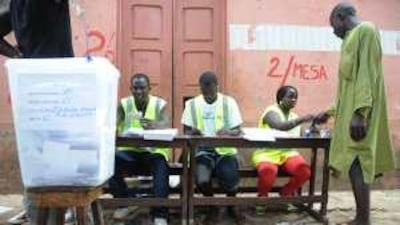BISSAU, GUINEA BISSAU // Troubled Guinea Bissau went to the polls yesterday, less than four months after a spate of assassinations rocked the West African country. Bissau-Guineans say bad things come in fours. In March, the long-time president Joao Bernardo Vieira was shot dead. The top army general was killed days earlier. Because the country is a pit stop on the cocaine trail between South America and Europe, an image crisis was already in full swing. Then elections were announced and one of the candidates was murdered in his bed.
Despite the violence, polling went ahead as planned yesterday. "Things can't really get much worse," said Abdel Gomes, who cast his vote early yesterday morning. "What else can we do but have a bit of faith that things will get better?" Desejado Lima da Costa, the head of the country's national election commission, said yesterday's vote was a chance to show the world that Guinea Bissau is not giving up on itself. "The vote is an important task for the stability of the nation. It will also reflect the credibility of the country." There are 600,000 registered voters in the Portuguese-speaking country, which sits south of Senegal on the West African coast. Eleven candidates are running to succeed Vieira but the race belongs to the opposition candidate Koumba Yala and the ruling party's Malam Bacai Sanha. Neither candidate is likely to win the vote outright and it is likely that a second round will be announced. A third front-runner, the independent candidate Henrique Rosa, is campaigning on a platform for change. Another candidate, Baciro Dabo, a close ally of Vieira, was murdered by government security forces at the beginning of this month in what is widely believed to be a tit-for-tat strategy. The government had accused him of planning a coup. No president has completed a five-year term in Guinea Bissau since the early 1990s. When voters went to the polls yesterday, Dabo's name was still on the ballot sheet. The cost of printing new ballot sheets was, it seems, deemed too expensive. Guinea Bissau is one of the poorest countries in sub-Saharan Africa, ranked 173 out of 177 in the UN's Human Development Index. Life expectancy is just 46 years. Unicef, the UN agency for children, says less than 30 per cent of children complete primary school. The rights group Amnesty International says dire economic conditions and drug trafficking threaten the fragile stability in Guinea Bissau. By anyone's standards life in the former Portuguese colony is tough. Even Joseph Mutaboba, the representative of the United Nations secretary-general in Guinea Bissau, admits his job is difficult. "We encounter many problems," he said. "Guinea Bissau has porous borders, it needs food security. But if the elections are successful there will be a basis for change - change for the better." The capital is ailing. Crumbling concrete falls from colonial-era houses, their once-grand façades faded by the sun. Pavements are broken, split by the colossal trunks of baobab trees; the government says there is no money to repair the damage. The presidential palace sits empty, abandoned since the civil war ended 10 years ago. "Guinea Bissau is sick," said the mechanic Josef Felitiano, who voted yesterday. "For this country to get better we're going to need a strong president."
But Luis da Graça, a writer, walked past the entrance to the polling station. "The candidate I was backing was shot dead. I'm not going to vote," he said. Across town, voters gathered outside the sports club where the late president Vieira once played football. It too is broken and hollowed out and the adjacent cinema showed its last film years ago. "It's hard to be positive about the future" said Saico Embado, carrying his 18-month-old daughter. "The lack of good education is letting the country down. Many people aren't educated enough to realise what they're letting themselves in for when they vote for a candidate. I'm not convinced things will be better when my daughter is old enough to vote." Rosa Fina, 28, was more optimistic. "I'm here to choose a president who can handle this country," she said. "We've had many crises but I do think things can change." Ruling party candidate Malam Bacai Sanha cast his vote at the same polling station. Dressed in a dark suit, he paused on the steps and called for support. "This moment is a chance for change, another phase for Guinea Bissau," he said. The independent candidate Mr Rosa looked relaxed in a loose black shirt and trousers. "Under my leadership you can expect peace," he said, smiling. Political analysts say Guinea Bissau's sole hope may lie with Mr Rosa. They also say he is unlikely to progress to the second round. Albertino Sequeiro Bragança is the president of the Community of Portuguese Language Countries, a group that has helped to solve political problems in São Tomé and Príncipe as well as Guinea-Bissau. "I've been pleasantly surprised by the level of co-operation and ease with which the elections have been organised," he said. "It's not always easy to find that in a troubled country like Guinea-Bissau." But in a country where corruption is ingrained in the highest echelons of society, few have faith in the future of government. Neto Domingos, a policeman, voted after attending mass at the Portuguese cathedral. He said he has more faith in God than Bissau-Guinean politics. "Politicians always break their promises in this country. Religion is a much better role model than government." "Living in Guinea Bissau is a bit like living in a forest," said Ivan Gomes, a musician. "When there are few imposed laws, whoever is strongest takes charge."
kthomas@thenational.ae

